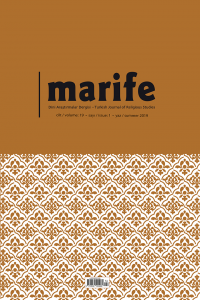
Marife Dini Araştırmalar Dergisi
Yazarlar: Harun ÇAĞLAYAN
Konular:Din Bilimi
DOI:10.33420/marife.800963
Anahtar Kelimeler:Kalām,Soul,Gabriel/Jibrīl,Personality,Barzāh
Özet: Man is a being with psychological and biological aspects. In every culture, there are words terms and approaches related to the spiritual aspect of humans. We can gather all these around the concept of soul. Basically, the concept of soul is based on the idea that, unlike other beings, human beings have an immortal side with some spiritual powers, independent of their finite material aspect. In addition to seeing dead people, it is observed that seeing oneself in other ways while sleeping and using their imagination while awake is effective in forming this understanding. The idea of soul and immortality of soul which represents the spiritual aspect of the individual throughout the history of humanity has played a great role in shaping religious beliefs with metaphysic values. In general, there are two concepts in Muslim culture that are associated with the word soul. The first one is the human soul as a complementary part that forms the soul-body integrity. The second one is angelic soul which is the revelation messenger that works as an intermediary element that enables the communication between Allah and human. In the Quran, which constitutes the origin of the Muslim belief, and in the early kalam literature, the concept of soul mainly refers to the angelic messenger called The Rūh al-Quds (Gabriel/Jibrīl), who is the bearer of revelation. What is widely known among the people about the soul is that it expresses the psychological aspect of a person and continues to live until the day of the resurrection when it reunited with the body after death. Although the concept of soul in terms of Islamic teachings is theoretically meant as the angel of revelation, from a practical point of view, the society perceives it as the human soul. For today, it is more important to determine on which context these concepts should be dealt with than to discus which is the true use of it. Since the communication between Allah and his messengers is a process that does not directly concern the society and it is not possible to reach clear information about its nature, so it is necessary to comment about the soul, which interpreted as the rūh al-quds, as much as the information given in the Quran. On the other hand, it is mentioned that very little information is given about the rūh al-quds in the Quran and advised that the attention is turned to the message he brought, not to the angel messenger. Muslims believe that the Rūh al-Quds, is a reliable messenger, did not add or remove anything from the revelation and delivered it to the prophets as he received from Allah. Therefore, it can be said that regarding the angel of revelation, there is not much to discuss about the understanding of soul. However, some points need to be clarified in order to be able to say the same about the concept of the soul understood as the human spirit. In Islamic teaching, there believed to be two different universes called the world and the afterlife. However, in the Muslim culture, influenced by the past cultures and religions, a third universe of beings, called The Barzakh, is mentioned between these two realms. In there, the souls of the dead wait till their resurrection on the judgement day. Spirits belonging to deceased righteous people such as prophets, saints, imams and martyrs, who are deemed virtuous due to some of their features in the life of the world, can contact people who have not yet died due to their privileges in the realm of the barzakh, and even physically make moves about the worldly life. According to the Muslim belief, the use of the concept of soul as an element representing the personality and self of the individual in the worldly life is a theo-psychological fiction, so it is seen that it does not cause any problems in general. Because it is a well-known fact that human has biological and psychological aspects, it should not be a problem to reconstruct it from a religious perspective. However, the use of the concept of soul as the immortal spiritual aspect of a person who continues to live independently of the body after death causes some theological problems. An understanding of an immortal soul independent of the body is a belief that is not necessary in terms of creed since it does not correspond to any position within the general purposes of Islamic teaching. In other words, to believe in the existence of a soul that lives independently of the body after the death, theologically is not within the purposes and the reasons of religious call (Taklīf). Likewise, the thought of the barzakh universe which is believed to be a place where souls regardless of the body are rewarded or tormented in, loses its function and meaning when evaluated together with the belief of hereafter.